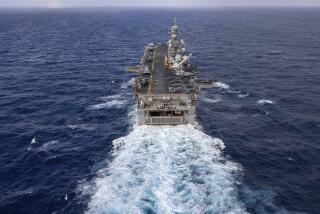U.S. captain once held by pirates urges arming crews
- Share via
WASHINGTON — The freed captain of a merchant ship attacked by pirates near Somalia last month called Thursday for military protection and armed crew members to thwart attacks in dangerous waters.
Capt. Richard Phillips, skipper of the Maersk Alabama, told the Senate Foreign Relations Committee that it was the “responsibility of the U.S. government” to protect any ship flying an American flag, through military escorts or onboard squads of highly trained security forces.
He added that an armed brigade of specially trained senior crew members also could deter pirate attacks in certain situations.
“And I don’t mean a security guard. I don’t mean a mall cop. I mean someone who’s sufficiently trained,” Phillips said
Phillips and the private shipping line’s chairman, John Clancey, differed in their prescriptions for addressing piracy in testimony Thursday. Clancey said arming and training crew officers would be prohibitively expensive and would result in a potentially deadly arms race with pirates.
But the recommendations from Phillips, widely regarded as a hero for selflessly trading his freedom in exchange for that of his 20-person crew, are likely to pressure the U.S. military to consider steps he outlined in the hearing. At the same time, military officials have said that world navies could not protect every ship, and they have recommended that vessel operators adopt more aggressive defenses.
Since the Maersk Alabama attack, the military has held several meetings with shipping companies, looking for better ways to deter pirates. Clancey said those talks were continuing.
He said Maersk Inc. had more than 500 merchant ships at sea, making the cost of training and arming crews a “very tall order,” and not one with guaranteed results.
“Our belief is that arming merchant sailors may result in the acquisition of ever more lethal weapons and tactics by the pirates, a race that merchant sailors cannot win,” Clancey said.
He also pointed out that most nations did not permit armed ships to enter ports or dock. Besides talks with military officials, Clancey said ships were being “hardened,” including the addition of electrified rails and pressure hoses.
Phillips agreed that more training in anti-piracy tactics and upgrading vessels would be an improvement, but said, “There is no way they can be foolproof.”
Phillips, 53, emphasized that the success of any method would hinge on a clear chain of command -- one that ends with the captain.
“In the heat of an attack, there can only be one final decision-maker,” he said.
Phillips called piracy a “crime of opportunity,” and said pirates were shifting their tactics as quickly as shipping companies made changes to foil them.
“There’s no silver bullet here,” he said. “One solution is not going to solve this problem.”
Panel members expressed interest in the idea of arming crews.
“Historically we have deputized citizens to engage in law enforcement activities, going way back to the posses,” said Sen. John F. Kerry (D-Mass.), the committee chairman.
--
More to Read
Sign up for Essential California
The most important California stories and recommendations in your inbox every morning.
You may occasionally receive promotional content from the Los Angeles Times.













